AWM41 993 - [Nurses Narratives] Sister Z A Lade
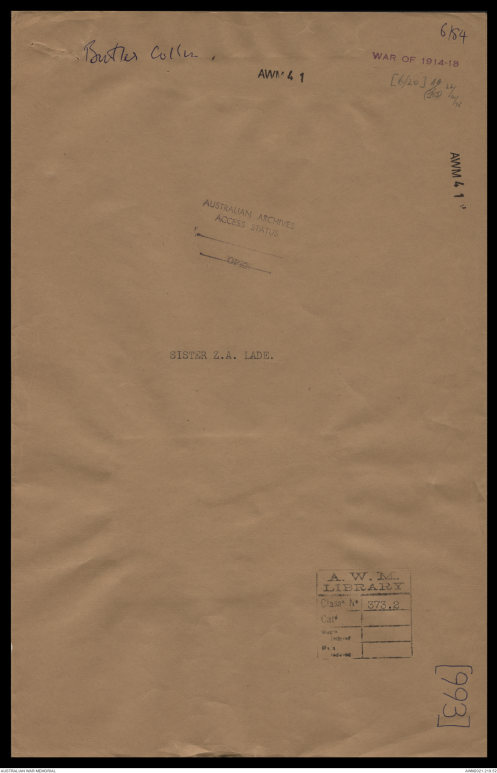
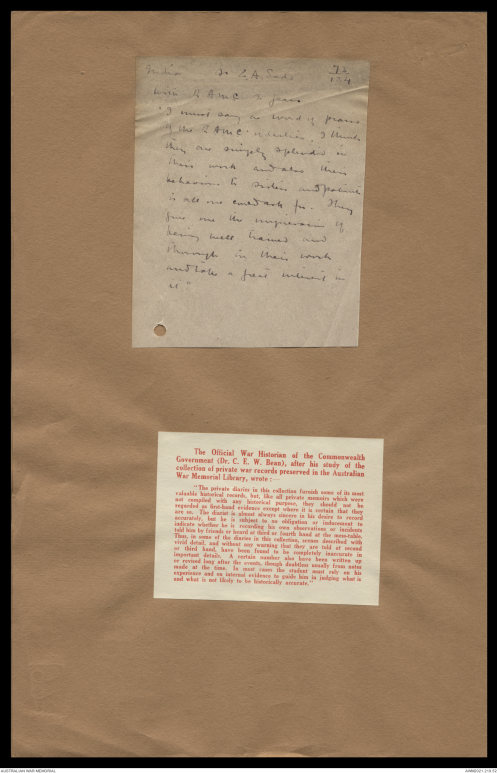
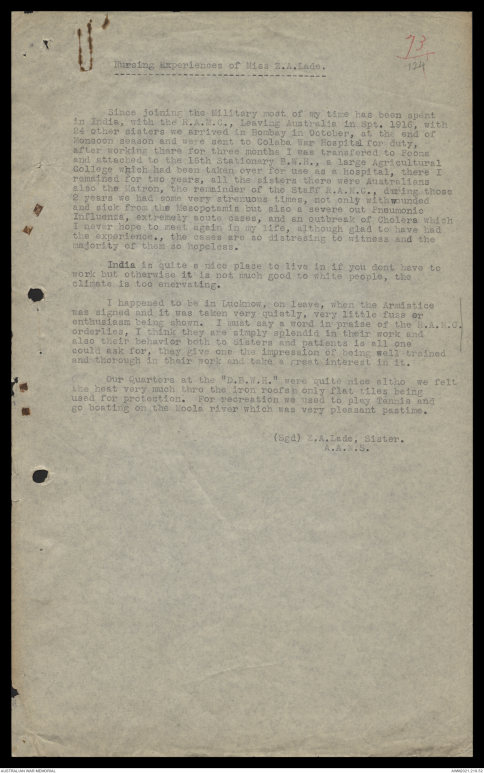
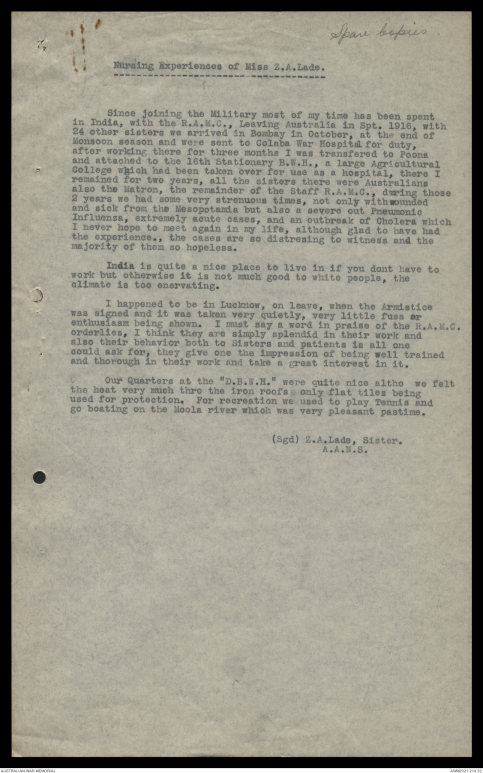
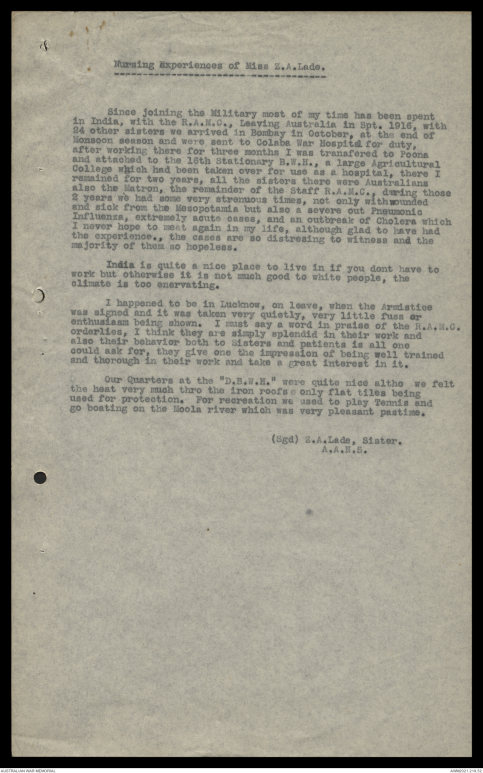
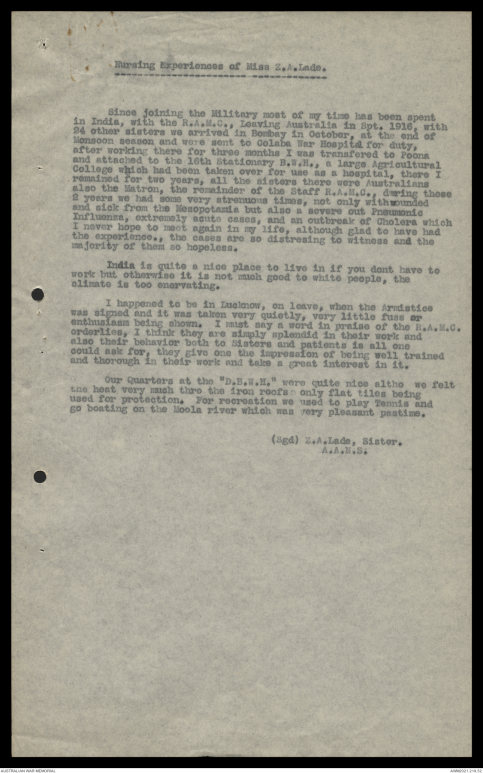
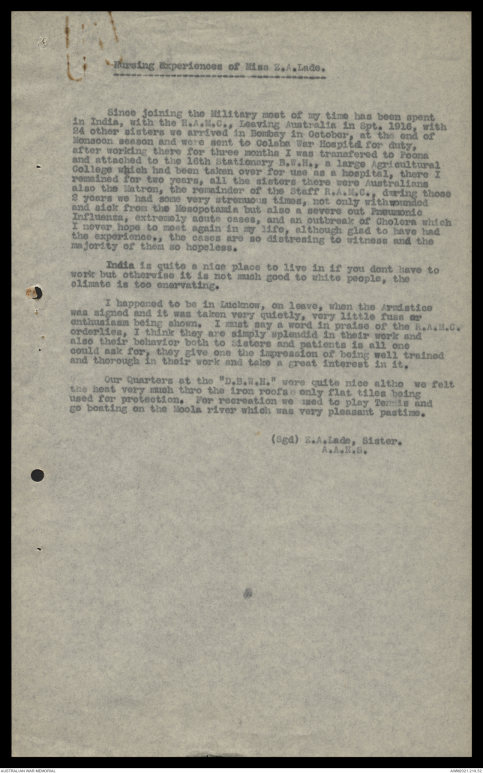
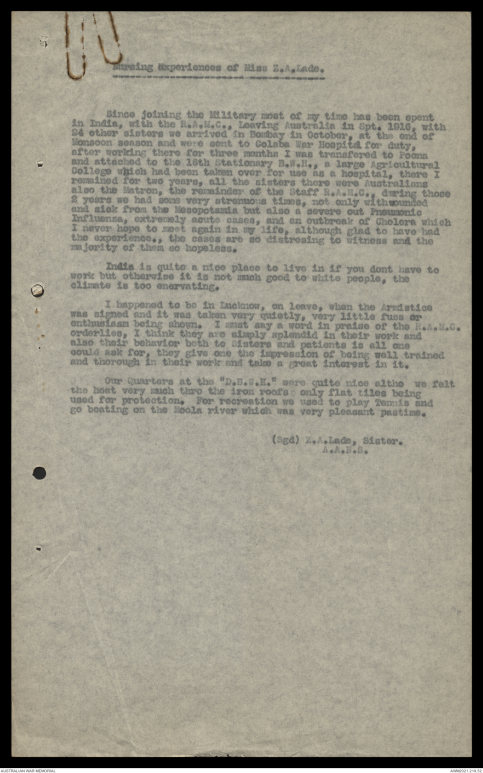
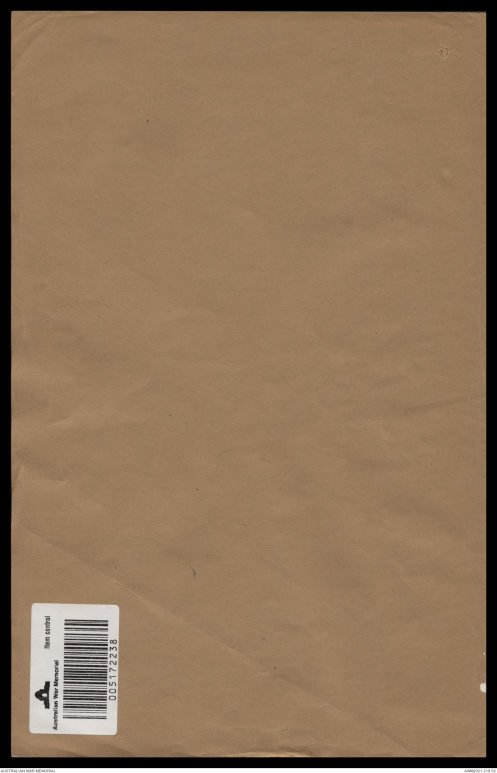
Butler colln. AWM 41 6/84
WAR OF 1914-18
[6/20] [[?]]
AWM 41
AUSTRALIAN ARCHIVES
ACCESS STATUS
OPEN
SISTER Z.A. LADE
A.W.M.
LIBRARTY
CLASS No 373.2
CAL
[[?]]
[[?]]
[993]
India [[?]] Z.A. Lade [[?]] 134
letter to the A.M.C [[??]]
"I must say the wording of praise
of the A.M.C, orderlies I think
they are simply splendid in
their work and also their
behaviour to sisters and patients
is all one could ask for. They
gave me the impression of
being well trained and
thorough in their work
and take a great interest in
it"
The Official War Historian of the Commonwealth
Government (Dr. C. E. W. Bean), after his study of the
collection of private war records preserved in the Australian
War Memorial Library, wrote:-
"The private diaries in this collection furnish some of its most
valuable historical records, but, like all private memoirs which were
not compiled with any historical purpose, they should not be
regarded as first-hand evidence except where it is certain that they
are so. The diarist is almost always sincere in his desire to record
accurately, but he is subject to no obligation or inducement to
indicate whether he is recording his own observations or incidents
told him by friends or heard at third or fourth hand at the mess-table.
Thus, in some of the diaries in this collection, scenes described with
vivid detail, and without any warning that they are told at second
or third hand, have been found to be completely inaccurate in
important details. A certain number also have been written up
or revised long after the events, though doubtless usually from notes
made at the time. In most cases the student must rely on his
experience and on internal evidence to guide him in judging what is
and what is not likely to be historically accurate".
Nursing Experience of Miss Z. A. Lade. 73/124
Since joining the Military most of my time has been spent
in India, with the R.A.M.C.. Leaving Australia in Spt. 1916, with
24 other sisters we arrived in Bombay in October, at the end of
Monsoon season and were sent to Colaba War Hospital for duty,
after working there for three months I was transferred to Fooma
and attached to the 15th Stationary B.W.B., a large Agricultural
College which had been taken over for use as a hospital, there I
remained for two years, all the sisters there were Australians
also the Matron, the remainder of the Staff R.A.N.C., during those
2 years we had some very strenuous times, not only with wounded
and sick form the Mesopotamia but also a severe out Pneumonic
Influenza, extremely acute cases, and an outbreak of Cholera which
I never hope to mee again in my life, although glad to have had
the experience., the cases are so distressing to witness and the
majority of them so hopeless.
India is quite a nice place to live if you dont have to
work but otherwise it is not much good to white people, the
climate is too enervating.
I happened to be in Lucknow, on leave, when the Armistice
was signed and it was taken very quietly, very little fuss or
enthusiasm being shown. I must say a word in praise of the R.A.N.C.
orderlies, I think they are simply splendid in their work and
also their behaviour both to Sisters and patients is all one
could ask for, they gave me the impression of being well trained
and thorough in their work and take a great interest in it.
Our Quarters at the "D.B.W.H." were quite nice altho we felt
the heat very much thro the iron roofs only flat tiles being
used for protection. For recreation we used to play Tennis and
go boating on the Moola river which was very pleasant pastime.
(Sgd) Z.A. Lade, Sister
A.A.N.S.
Nursing Experience of Miss Z. A. Lade. Spare Copies
Since joining the Military most of my time has been spent
in India, with the R.A.M.C.. Leaving Australia in Spt. 1916, with
24 other sisters we arrived in Bombay in October, at the end of
Monsoon season and were sent to Colaba War Hospital for duty,
after working there for three months I was transferred to Fooma
and attached to the 15th Stationary B.W.B., a large Agricultural
College which had been taken over for use as a hospital, there I
remained for two years, all the sisters there were Australians
also the Matron, the remainder of the Staff R.A.N.C., during those
2 years we had some very strenuous times, not only with wounded
and sick form the Mesopotamia but also a severe out Pneumonic
Influenza, extremely acute cases, and an outbreak of Cholera which
I never hope to mee again in my life, although glad to have had
the experience., the cases are so distressing to witness and the
majority of them so hopeless.
India is quite a nice place to live if you dont have to
work but otherwise it is not much good to white people, the
climate is too enervating.
I happened to be in Lucknow, on leave, when the Armistice
was signed and it was taken very quietly, very little fuss or
enthusiasm being shown. I must say a word in praise of the R.A.N.C.
orderlies, I think they are simply splendid in their work and
also their behaviour both to Sisters and patients is all one
could ask for, they gave me the impression of being well trained
and thorough in their work and take a great interest in it.
Our Quarters at the "D.B.W.H." were quite nice altho we felt
the heat very much thro the iron roofs only flat tiles being
used for protection. For recreation we used to play Tennis and
go boating on the Moola river which was very pleasant pastime.
(Sgd) Z.A. Lade, Sister
A.A.N.S.
Nursing Experience of Miss Z. A. Lade.
Since joining the Military most of my time has been spent
in India, with the R.A.M.C.. Leaving Australia in Spt. 1916, with
24 other sisters we arrived in Bombay in October, at the end of
Monsoon season and were sent to Colaba War Hospital for duty,
after working there for three months I was transferred to Fooma
and attached to the 15th Stationary B.W.B., a large Agricultural
College which had been taken over for use as a hospital, there I
remained for two years, all the sisters there were Australians
also the Matron, the remainder of the Staff R.A.N.C., during those
2 years we had some very strenuous times, not only with wounded
and sick form the Mesopotamia but also a severe out Pneumonic
Influenza, extremely acute cases, and an outbreak of Cholera which
I never hope to mee again in my life, although glad to have had
the experience., the cases are so distressing to witness and the
majority of them so hopeless.
India is quite a nice place to live if you dont have to
work but otherwise it is not much good to white people, the
climate is too enervating.
I happened to be in Lucknow, on leave, when the Armistice
was signed and it was taken very quietly, very little fuss or
enthusiasm being shown. I must say a word in praise of the R.A.N.C.
orderlies, I think they are simply splendid in their work and
also their behaviour both to Sisters and patients is all one
could ask for, they gave me the impression of being well trained
and thorough in their work and take a great interest in it.
Our Quarters at the "D.B.W.H." were quite nice altho we felt
the heat very much thro the iron roofs only flat tiles being
used for protection. For recreation we used to play Tennis and
go boating on the Moola river which was very pleasant pastime.
(Sgd) Z.A. Lade, Sister
A.A.N.S.
Nursing Experience of Miss Z. A. Lade.
Since joining the Military most of my time has been spent
in India, with the R.A.M.C.. Leaving Australia in Spt. 1916, with
24 other sisters we arrived in Bombay in October, at the end of
Monsoon season and were sent to Colaba War Hospital for duty,
after working there for three months I was transferred to Fooma
and attached to the 15th Stationary B.W.B., a large Agricultural
College which had been taken over for use as a hospital, there I
remained for two years, all the sisters there were Australians
also the Matron, the remainder of the Staff R.A.N.C., during those
2 years we had some very strenuous times, not only with wounded
and sick form the Mesopotamia but also a severe out Pneumonic
Influenza, extremely acute cases, and an outbreak of Cholera which
I never hope to mee again in my life, although glad to have had
the experience., the cases are so distressing to witness and the
majority of them so hopeless.
India is quite a nice place to live if you dont have to
work but otherwise it is not much good to white people, the
climate is too enervating.
I happened to be in Lucknow, on leave, when the Armistice
was signed and it was taken very quietly, very little fuss or
enthusiasm being shown. I must say a word in praise of the R.A.N.C.
orderlies, I think they are simply splendid in their work and
also their behaviour both to Sisters and patients is all one
could ask for, they gave me the impression of being well trained
and thorough in their work and take a great interest in it.
Our Quarters at the "D.B.W.H." were quite nice altho we felt
the heat very much thro the iron roofs only flat tiles being
used for protection. For recreation we used to play Tennis and
go boating on the Moola river which was very pleasant pastime.
(Sgd) Z.A. Lade, Sister
A.A.N.S.
Nursing Experience of Miss Z. A. Lade.
Since joining the Military most of my time has been spent
in India, with the R.A.M.C.. Leaving Australia in Spt. 1916, with
24 other sisters we arrived in Bombay in October, at the end of
Monsoon season and were sent to Colaba War Hospital for duty,
after working there for three months I was transferred to Fooma
and attached to the 15th Stationary B.W.B., a large Agricultural
College which had been taken over for use as a hospital, there I
remained for two years, all the sisters there were Australians
also the Matron, the remainder of the Staff R.A.N.C., during those
2 years we had some very strenuous times, not only with wounded
and sick form the Mesopotamia but also a severe out Pneumonic
Influenza, extremely acute cases, and an outbreak of Cholera which
I never hope to mee again in my life, although glad to have had
the experience., the cases are so distressing to witness and the
majority of them so hopeless.
India is quite a nice place to live if you dont have to
work but otherwise it is not much good to white people, the
climate is too enervating.
I happened to be in Lucknow, on leave, when the Armistice
was signed and it was taken very quietly, very little fuss or
enthusiasm being shown. I must say a word in praise of the R.A.N.C.
orderlies, I think they are simply splendid in their work and
also their behaviour both to Sisters and patients is all one
could ask for, they gave me the impression of being well trained
and thorough in their work and take a great interest in it.
Our Quarters at the "D.B.W.H." were quite nice altho we felt
the heat very much thro the iron roofs only flat tiles being
used for protection. For recreation we used to play Tennis and
go boating on the Moola river which was very pleasant pastime.
(Sgd) Z.A. Lade, Sister
A.A.N.S.
Nursing Experience of Miss Z. A. Lade.
Since joining the Military most of my time has been spent
in India, with the R.A.M.C.. Leaving Australia in Spt. 1916, with
24 other sisters we arrived in Bombay in October, at the end of
Monsoon season and were sent to Colaba War Hospital for duty,
after working there for three months I was transferred to Fooma
and attached to the 15th Stationary B.W.B., a large Agricultural
College which had been taken over for use as a hospital, there I
remained for two years, all the sisters there were Australians
also the Matron, the remainder of the Staff R.A.N.C., during those
2 years we had some very strenuous times, not only with wounded
and sick form the Mesopotamia but also a severe out Pneumonic
Influenza, extremely acute cases, and an outbreak of Cholera which
I never hope to mee again in my life, although glad to have had
the experience., the cases are so distressing to witness and the
majority of them so hopeless.
India is quite a nice place to live if you dont have to
work but otherwise it is not much good to white people, the
climate is too enervating.
I happened to be in Lucknow, on leave, when the Armistice
was signed and it was taken very quietly, very little fuss or
enthusiasm being shown. I must say a word in praise of the R.A.N.C.
orderlies, I think they are simply splendid in their work and
also their behaviour both to Sisters and patients is all one
could ask for, they gave me the impression of being well trained
and thorough in their work and take a great interest in it.
Our Quarters at the "D.B.W.H." were quite nice altho we felt
the heat very much thro the iron roofs only flat tiles being
used for protection. For recreation we used to play Tennis and
go boating on the Moola river which was very pleasant pastime.
(Sgd) Z.A. Lade, Sister
A.A.N.S.
 Sam scott
Sam scottThis transcription item is now locked to you for editing. To release the lock either Save your changes or Cancel.
This lock will be automatically released after 60 minutes of inactivity.